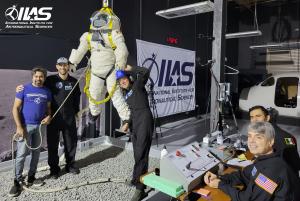
Reduced Gravity Laboratory Established at Florida Tech's Center of Aeronautics and Innovation
The International Institute for Astronautical Sciences inaugurates a novel gravity-offset facility for space suit, bioastronautics, and space robotics research.
Developed by the International Institute for Astronautical Sciences (IIAS), the gravity offset lab uses electromechanical means to simulate reduced gravity levels along a translational path 24-feet long. A bed of simulated lunar regolith was in place for initial testing in mid-April.
The new facility is one of several powerful tools available to help evaluate space suits and other tech, said IIAS Executive Director Jason Reimuller.
“You still have altitude chamber testing, you still have microgravity testing, but a gravity-offset laboratory allows you to do a lot of other tests, and you can do these tests all day at relatively low cost,” he said. “And unlike testing in parabolic aircraft or underwater, your support personnel are right there in a 1G laboratory environment.”
The lab provides these differing gravity environments by utilizing sensors that take hundreds of readings per second of the forces at work with the test subject – forces the system’s motor can be constantly adjusting. The system is described as “gravity offset” because that refers to how the motor compensates for the subject’s weight. A separate electromechanical system permits translation of the test subject along the testbed.
Like NASA’s Active Response Gravity Offload System (ARGOS), the new lab was built to evaluate a variety of technologies in reduced gravity environments, including space suits in both lunar gravity and zero-G.
The preliminary tests on the new system featured a prototype space suit provided to IIAS by Final Frontier Design, a company acquired by Paragon Space Development Corporation in 2022 to further develop space suit technologies under the Axiom contract to NASA.
Aside from technical evaluations of the space suit, various evaluations of human performance were conducted, including comparative assessments of 3D-printed tools designed for operation in space or on the lunar surface. Additionally, the effectiveness of several methods of enhancing mobility on the lunar surface were tested.
The initial research team consisted of Shawna Pandya of Edmonton, Alberta; Heidi Hammerstein of Cordele, Ga.; Brien Posey of Rock Hill, S.C.; John Michael Espinosa of League City, Texas; Mac Malkawi of York, Pa.; Alejandro Garcia of Miami, Fla.; David Guajardo of Mexico City; Dara Dotz of San Francisco, Calif.; Guadalupe Gastellum of New York, N.Y.; and Ken Ernandes of Melbourne Beach.
For Reimuller and IIAS, the new facility is a welcome addition. In addition to its Florida Tech facility, the organization has a network of synergistic campuses, he said, including an egress lab and a neutral buoyancy lab in Groton, Conn., and a Canadian outpost in Ottawa where parabolic flights and microgravity sciences are the focus.
IIAS has several areas of study that utilize these operations, including astronomy, upper atmosphere science, bioastronautics and human factors and performance. “We have a long-term vision here at Florida Tech of creating opportunities and facilities that can help bring aviation, medicine and engineering together to enable cutting-edge research in space-related fields,” Reimuller said.
The gravity offset facility will be available for industry use. For more information about the capabilities and use of the facility, please contact IIAS at astronauticsinstitute.org.
________________________________________
About the International Institute for Astronautical Sciences
Founded in 2015, the International Institute for Astronautical Sciences (IIAS) is a 501c3 nonprofit research and education organization with licensure from the State of Connecticut. With students from over 50 different countries, IIAS provides educational services and research opportunities in aeronomy, bioastronautics, microgravity science, space suit evaluation, operational science, and flight test engineering through partnerships with the National Research Council of Canada, Florida Tech, Survival Systems USA, NAUI, and the Canadian Space Agency. IIAS hosts ‘Project PoSSUM’ and ‘Project OTTER’ research programs for aeronomy and EVA space suit evaluation research, respectively. Additionally, IIAS also sponsors three outreach programs designed to serve under-represented minorities in STEM: PoSSUM13, Out Astronaut, and Space for all Nations. More information at astronauticsinstitute.org.
About Florida Tech:
The premier technological university in the Southeast, Florida Tech is a Tier 1 Best National University (U.S. News & World Report) and a Top Technical Institute (Fiske Guide to Colleges), as well as a Best Value University (Forbes) and a top 100 global university for graduate employability (GEURS). Florida Tech is known worldwide for its strengths in aerospace, advanced manufacturing, aviation, autism treatment, biomedical science, cybersecurity and machine-learning, and marine science. It offers more than 150 bachelor’s, master’s and doctoral degrees in engineering, science, computing, aeronautics, business, psychology and the liberal arts. The university is located in the dynamic and innovative city of Melbourne in the heart of the “Space Coast,” where students have been watching rocket launches from campus since the dawn of the Space Race. Learn how Florida Tech is making history and shaping the future at floridatech.edu. Find stories about our relentless pursuit of greatness at floridatech.edu/news.
Jason Reimuller
International Institute for Astronautical Sciences
+1 720-352-3227
jason.reimuller@integratedspaceflight.com
Visit us on social media:
Facebook
Twitter
LinkedIn
Instagram
YouTube
IIAS Gravity-Offset Research Laboratory
Distribution channels: Aviation & Aerospace Industry, Companies, Education, Science, Technology
Legal Disclaimer:
EIN Presswire provides this news content "as is" without warranty of any kind. We do not accept any responsibility or liability for the accuracy, content, images, videos, licenses, completeness, legality, or reliability of the information contained in this article. If you have any complaints or copyright issues related to this article, kindly contact the author above.
Submit your press release


